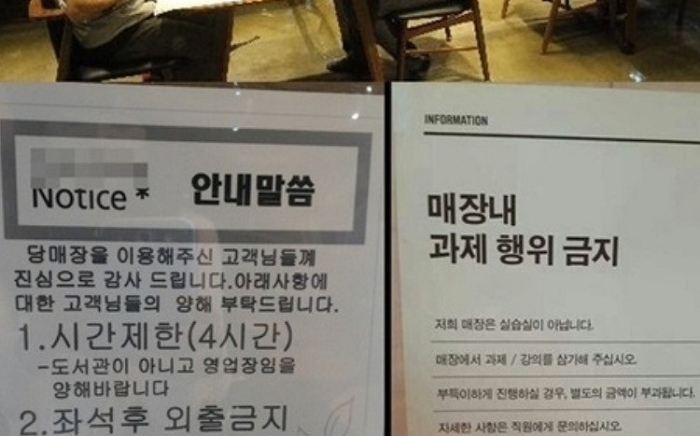 |
| ▲ Some cafes don't let customers study for a long time. |
Korea’s cafes have become a battleground for consumers, each wanting to claim their use for their own selfish purposes. First, we saw many customers argue for No Kids Zones, as patrons argued some children were causing disturbances, burdening shop owners, while parents did nothing to control their children or even look after their safety. Second, due to changing study habits, many people are more likely to seek out cafes to get work done, rather than study rooms or even a library, despite the noise or crowds. These people are called ‘Ca-gong-jok’ (people who study in cafes). As more students are trying to study in cafes, a call for No-Study Zones in coffee shops around the country, has started to take root. In these zones, people would not be allowed to study for a long period of time, a policy proposal which is controversial for both customers and coffee shop owners alike. Some says it is violation of consumer rights, but others say it is a reasonable request by those who use the space for chatting and meeting with others.
Therefore, the Dankook Herald (The DKH) conducted survey on this issue, to learn what our students think about this controversial policy. We learned that for group studies, including debating and sharing knowledge; almost half of the respondents stated that they are likely to choose studying in a café or private study room over being surrounded by a calm and peaceful atmosphere like the library. Meanwhile, almost 30% of them use normal cafes so they can have food and beverages easily accessible. However, when they want to study alone, without communicating with others, more than half of them (52.5%) said they preferred to study at home, compared to about 15% of them who said they preferred cafes in order to avoid too much silence and the stuffy air of their room at home. Moreover, when asked if they had experienced a ‘No-Studying Zone,’ only 12% of respondents said yes, they had already been to a café with this policy in place. The rest of them all answered no, they had never experienced this kind of coffee shop policy. Overall, the majority of respondents believed that it was fair enough to restrict the study time of students in cafes, but their reasons were divided. Most said cafes are commercial and business spaces, so the restriction of use for an extended period is a reasonable demand, while others argued that studying was not harmful to patrons, so they couldn’t understand why a need for such a policy existed.
The DKH wanted to hear from coffee shops owners to learn more about their perspective on this debate. We interviewed an owner managing a café near Hyehwa-dong, Seoul; a district surrounded by several universities. He stated that studying in his cafe has rarely harmed his business because there are a lot of private institutes near his café, and this is in fact, very profitable for him. As a café owner he could see how it might create more waste or lead to occupying too many seats during peak periods, but overall he feels that calling for this kind of restriction might be an overreaction by some customers. There are diverse sale situations in cafes, so coffee shops need to be more flexible or institute policies that could help curb the problem, if it is affecting their business. He suggests perhaps asking customers who stay for a long period of time to order more or simply post a statement about the requirements for using the location for an extended period. He said, “I think there needs to be some form of consent to the using cafes appropriately, and it would really help each party, including the owners, the customers there to study and those who are there to chat with others.”
To better understand the nation’s brewing No-Study Zone issue, the DKH interviewed Park Chung-hun, Ph.D in Public Administration, and the Director of the Department of Society & Governance at the Gyeonggi Research Institute. Increased demand for regulating spaces with No-Kids-Zones and No-Study-Zones in South Korea show a lack of empathy in our society. “Surely, it is not difficult to understand the perspective of others and handle it without zoning policies. Making noise in public areas is harmful to others, also over-occupying seats in a profit-making business is a loss to owners”, he explained. “Children are not the cause of the No-Kids controversy, likewise, in these No-Study debates, it is not fault of students studying in cafes. The only important thing is how we see and treat one another.”
As for a solution to these controversies, he emphasized the need for a campaign to improve manners in public areas, rather than enforced policies by government. Moreover, the issues came to the attention of the general public through social media like Twitter. He stated that while the discussion is good for society, to build a better consensus on the issue, the inflammatory hatred often seen on social media should be excluded.
The increase in controversy surrounding simple problems like this indicates a narrow-minded hate developing towards others in our society. Methods of communication are more diverse, simple, and easier than ever before, so we should put more effort into understanding each other before we respond with knee-jerk communication. Since the various cafes around DKU are predominately supported by Dankookians (students of Dankook University), we might never be exposed to a No-Study Zone policy around our campus. However, it is clear that this issue could be a good way for us to invite a more positive culture of respect towards each other, improving overall, Dankook society.
박해지, 윤진현 dankookherald@gmail.com

![[Campus Magnifier] Let's Surf the Library!](/news/photo/202404/12496_1765_4143.jpg) [Campus Magnifier] Let's Surf the Library!
[Campus Magnifier] Let's Surf the Library!
![[Campus Magnifier] Let's Surf the Library!](/news/thumbnail/202404/12496_1765_4143_v150.jpg)





